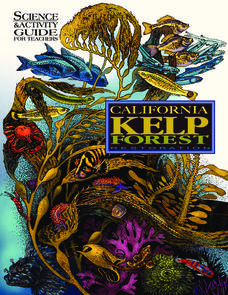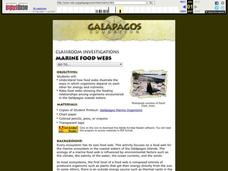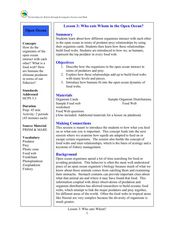Curated OER
Food Web Mobile
Students explain the main concepts of food webs and food chains. They
describe the role of animals, plants, and other organisms in cycling energy and matter through a food web by creating mobiles. Lesson contains adaptations for all levels.
Curated OER
The Ocean Floor and Shore Zones
Make textbook reading more engaging using this reading activities instructional activity, through which scholars review major features found on the ocean floor and the processes that formed these features. They complete 11 terms in a...
NOAA
Sustaining Our Ocean Resources
Lead young scientists on an investigation of fishery practices with the final installment of this four-part unit. Using a PowerPoint presentation and hands-on simulation, this lesson engages children in learning how fish populations are...
Dawn N . Ericson
California Kelp Forest Restoration
This unit is so cool, you won't be able to "kelp" yourself! Intended for all grades, this science and activity guide for teachers offers a unique opportunity to understand kelp's role as a valuable ecological resource. Teachers and...
Consortium for Ocean Science Exploration and Engagement (COSEE)
Arctic Smorgasbord
Though the walrus spends roughly one third of its time on land, it eats organisms that live on the bottom of the ocean. The first in a series of five, the lesson uses a variety of plant and animal cards to have scholars build an arctic...
Ask a Biologist
It’s a Plankton Eat Plankton World
For as small as they are, plankton sure play an enormous role in maintaining marine ecosystems. Dive into an investigation of these tiny organisms with a hands-on life science activity in which children cut out pictures of sea animals...
Curated OER
One World Ocean
Students compare and contrast the properties of salt water in the oceans/seas and freshwater elsewhere on the planet. They also analyze mixing caused by currents in the ocean, including the effects of warm and cold water as well as with...
Curated OER
What Foods Contain Products from the Ocean
Fifth graders learn about foods from the ocean. In this ocean products instructional activity, 5th graders brainstorm what foods come from the ocean, fill in a Venn Diagram comparing alginates, carrageenans and beta carotenes. Students...
Curated OER
Marine Food Webs
Students examine how food webs illustrate the ways in which organisms depend on each other for energy and nutrients, and make food webs showing the feeding relationships among organisms encountered in the Gal??pagos coastal waters.
Curated OER
Ocean Floor Model
Students construct a simulated model of the ocean floor in a shoe box. They determine that the floor of the ocean is composed of hills, plains, ridges, trenches, and sea mounts. They draw out a plan for their ocean floor which includes...
Curated OER
Introduction to Ocean Grazers
Students explore biology by creating a poster with classmates. In this oceanography lesson, students identify the importance of coral reefs to the ocean's ecology and examine a food web of ocean animals. Students define a list of...
Curated OER
What Lives in the Open Ocean and Where Do They Live?
Students explore oceanography by participating in a flash card activity. In this ocean inhabitant lesson, students define a list of ocean related vocabulary terms and answer ocean geography study questions. Students utilize organism...
Curated OER
A House for Me- Ocean Environments
Students explore ocean environments. In this ocean environment lesson, students identify the things ocean animals need for survival. Students use KWL charts and search the Internet collecting information about ocean habitats. Students...
Curated OER
Ocean Exploration
Learners explore whales. In this animal adaptation and whale lesson plan, students access prior knowledge about whales from previous lessons, then use background knowledge to predict the eating strategies of a baleen whale and a toothed...
Curated OER
Critters in the Classroom
Students investigate with sea urchins. In this ocean habitat lesson, students observe sea urchins and other ocean grazers. Students work with lab equipment to examine the anatomy of these creatures.
University of Southern California
What's the Catch?
There must be a catch! A comprehensive lesson looks at ocean fishing concerns through a set of five hands-on activities. Learners become aware of the risks of seafood contamination and factors that have affected the ocean environment.
Curated OER
Who Eats Whom in the Open Ocean?
Students examine how organisms interact with one another in the ocean. For this science lesson, students discuss predators and prey in the ocean. Students discuss food webs and how organisms interact with each other.
Curated OER
Food Webs
Young scholars create a bulletin board display illustrating food chains they make from a list of ocean organisms. Students also play a game showing what happens when one of the organisms is removed from the food chain and how they are...
Curated OER
Food Web
Students are able to define food web, and identify the interdependence of organisms within a system. They are able to describe how natural events and human activities can impact a food web.
Curated OER
Give me Food!
Students study the food guide pyramid and use it to create their own eating program.In this health lesson students visit websites to calculate their BMR, activity level and weight then create a nutrition plan
Curated OER
A Coastal Arctic Food Web
High schoolers create a food web of the arctic ecosystem. In this biology lesson plan, students explain how global warming affects this ecosystem. They explain how losing a species affects the entire community.
Curated OER
Week 8 - Sea Life
Using a magnifier, mini marine biologists examine the barbules of a bird feather. They swirl the it into a mixture of oil and water and then re-examine the feather. After the activity, discuss how the oily feathers pose a problem to sea...
Curated OER
Marine Ecosystems
Students identify producers and consumers and construct a food chain from four marine ecosystems. They describe the delicate balance among organisms in each environment. In groups, students discuss the human activities that upset the...
Curated OER
The Chesapeake Bay in Captain John Smith's Time
When Captain John Smith visited the Chesapeake Bay in the summer of 1608, what types of animals and habitats did he encounter? Your young historians will analyze primary source documents to answer this question, as well as compare the...

























